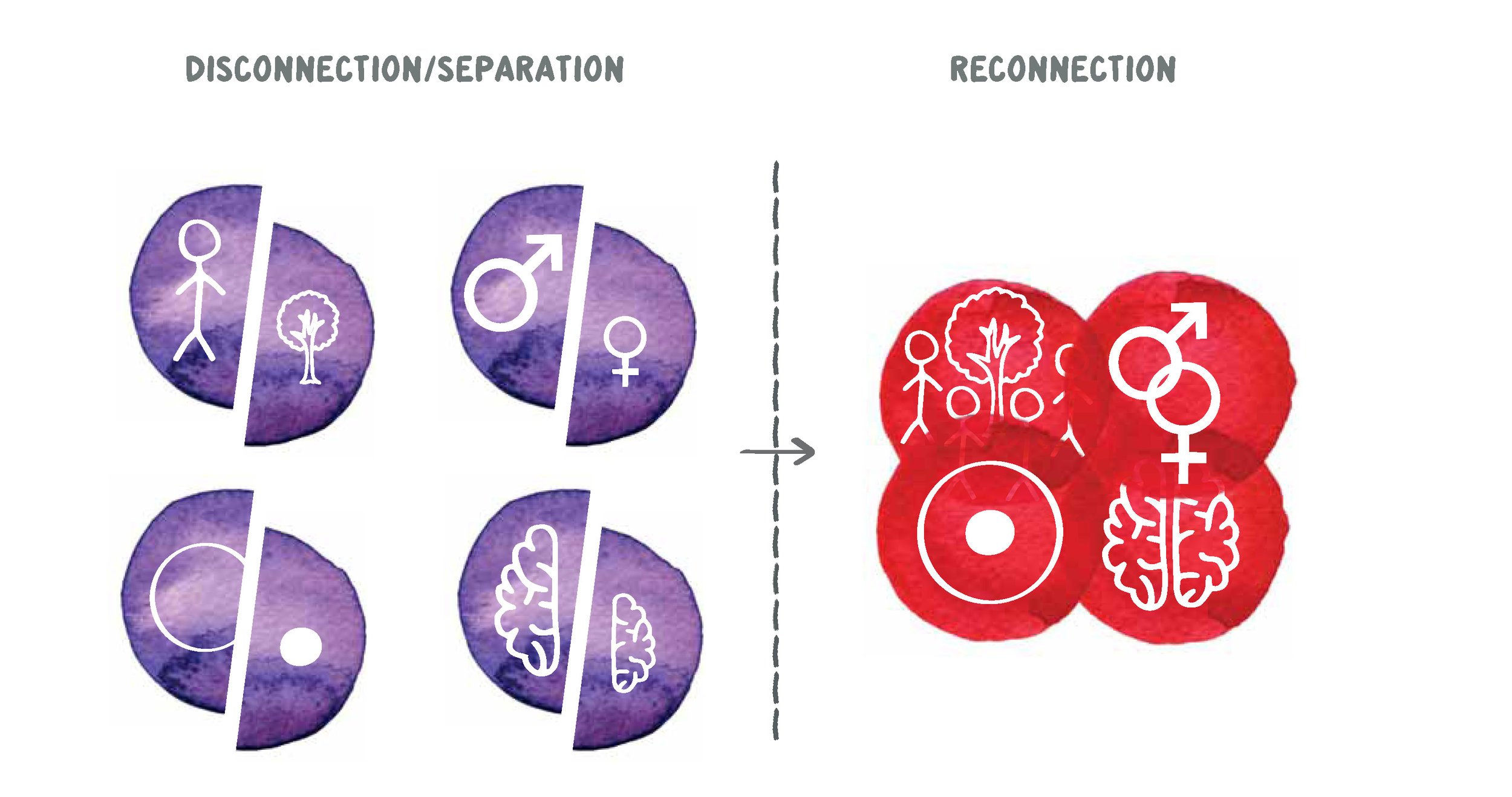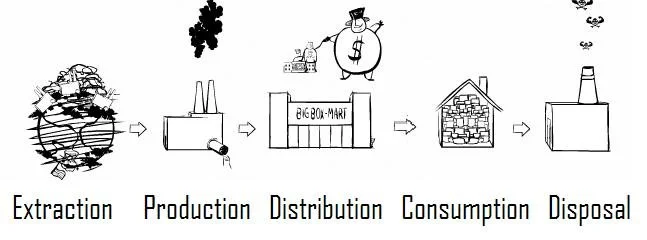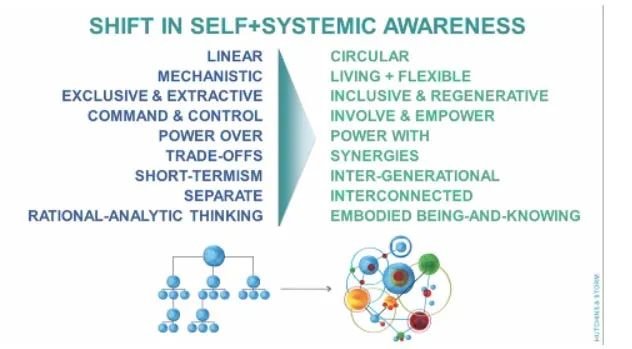The Age of Regeneration
Everything is interconnected and interrelated, we live in a vast, planetary ecosystem in which each part of the whole has an impact on the rest, especially now that we are living in a post-globalized world heavily impacted by human behavior.
The Age of Separation
An outdated but highly influential worldsense in the global system we experience today began to emerge following two micro ice ages 10,000 and 500 years ago, respectively.
The former caused what anthropologists view as the Ego Explosion in which humans began to experience themselves as separate to nature rather than part of it.
The latter, in combination with strong Christian dogmatic influence, caused people of Western European origin to blame these inhospitable forces of nature as the Devil’s work.
Leaders of the church began demonizing nature, animism, and those close to nature like women and those with spiritual beliefs that differed from Christianity and were more reverent of nature.
This all resulted in 300 years of witch trials, oppression, and countless acts of forcibly converting people’s religious beliefs throughout all of Western imperialism, patriarchy and colonization.
Thus emerged the Scientific Revolution, in which prominent minds of the time sought to subordinate, control, and exploit nature and all those close to it through scientific discovery.
Francis Bacon, lauded as the Father of the Scientific Method, wrote in 1620 that nature’s secrets were “locked in nature’s bosom,” “laid up in the womb of nature” saying that “she would have to be forcibly penetrated in order to make her give them up” so that “Nature being known, may be master’d, managed, and used in the services of human life” as the “object of knowledge is the control of nature.” He wrote, “Nature in itself has no purpose.”
This was the most influential thought leader of the 17th century.
What we’ve observed since then has been imperialism, colonization, genocide, slavery, social stratification, eugenics, oppression and exploitation, along with great technological advancement and scientific breakthroughs in understanding how many parts of this planet and universe work.
Knowledge and progress are wonderful things, if they are being used in a way that is supporting the well-being of individuals, communities, and our shared ecosystem, but unfortunately, knowledge and progress’s historical roots in the demonizaion, subordination, control, and exploitation of nature and those close to it has led us to build destructive systems that are harming us all and the planet we live on.
Similarly, capitalism has done a tremendous job in allowing individuals to pursue ownership and wealth and to increase the economic prosperity of certain nations. There is nothing wrong with technology or money themselves, they are simply means and fuel, but means and fuel can be obtained and used in either destructive or beneficial ways, and it is important that we make sure we are making decisions that are helpful for our collective health, happiness and longevity.
As Edward Abbey once wrote, “Growth for the sake of growth is the ideology of the cancer cell” and increasing a nation’s Gross Domestic Product and technological advancement doesn’t necessarily improve quality of life, especially when our means of doing so break down our mental, communal, and environmental health.
Right now, 1.1% of the global population holds nearly half of the world’s total wealth, and the top 1% has the largest carbon footprint than the rest of the world.
We have a Linear Materials Economy, in which we extract resources from the earth with no regard to how we will renew that resource, and then we produce, distribute, consume, and then dispose of the goods we create using those resources, and they go into the land, ocean, and atmosphere in the form of pollution which degrades our ecosystem and destroys biodiversity.
Illustration of the Linear Materials Economy from The Story of Stuff by Annie Leonard
We live in a consumerist culture where we are encouraged to buy as much as we possibly can, exacerbating the issue.
Capitalism assumes that we are all starting from the same baseline and working up on equal terms.
This is not the case.
It is necessary to take into consideration the cultural and historical context of indigenous genocide, African slavery, racism, religious discrimination, imperialism, sexism, homophobia, transphobia, eugenics, neurostandardization, and ableism.
The continued discrimination and oppression of minorities and disadvantaged groups is rewarded due to competition within capitalism. White, straight, cis-gender, neurotypical, able-bodied men created our current economic system and social stratification and thus benefit from the disenfranchisement of people diverse to them.
Thus proximity to whiteness, masculinity, heterosexuality, etc. is rewarded financially and those who benefit from that proximity also gain from perpetuating the pyramid.
This assumption that individuals can succeed on their own regardless of their starting position within this stratification is simply false and extremely damaging. Competing with one another, feeling as though we have the whole world on our shoulders, having us believe that we can achieve great wealth if we simply work hard enough on our own, it leads to the destruction of communities, relationships, and our own health, as we experience burnout and hopelessness.
Privilege exists and it is not distributed equitably, creating unfair circumstances for the majority of the world’s population.
Our dependence on money and corporations to survive is damaging to our communities and our countries. It forces us to take jobs that don’t pay us enough that take up all of our time and energy just so that we can live paycheck to paycheck. We have no time or space to support each other or to become politically active to shape our systems into being more supportive to our needs.
We commodify every aspect of ourselves, and begin to see everyone and everything as either a commodity or something to be exploited for personal gain, because in this system, money is everything.
When we compete with each other in the context of consumerism, it becomes a dog-eat-dog, envy-riddled culture in which we feel animosity or apathy for our peers and neighbors, seeking to be the person with the newest fashion, gadgets, and vehicles, to posture ourselves as powerful and socially prestigious because it is physically unsafe to be poor within our system.
Most don’t have access to affordable housing, high-quality education or healthcare, everything costs money, even necessities like food, clothing, electricity and safe water, and we look up to the Jeff Bezos’ of the world who extract and exploit from people and the world just to hoard billions of dollars, trying to be the best at emulating him so we can “win” the game of capitalism.
Late stage capitalism is like the end of a game of monopoly, where one person is hoarding all the cash and the rest of us go broke trying to pay for our ability to even stand on the board.
I’m sure you can feel it each and every day, if not within yourself, when you look at the world and the people around you and see so many suffering.
We tend to blame individuals for responding to the system in very understandable ways. Mental health issues, being burnt out, stressed out, and hopeless under a system that is unsupportive of you and actively destroying our communities and our planet, of course we would be having issues.
It’s not up to individuals to hoist themselves up by the bootstraps under an exploitative system that doesn’t care about them and most of the time, actively oppresses them. People shouldn’t have to be forced to participate and reinforce in an extractive, unfair system just to be able to be alive and enjoy their life.
It’s time to change things.
The Age of Regeneration
We are well into the Anthropocene, or the epoch of Earth’s history in which human behavior is deciding the fate of the entire Earth as we know it. Right now, it’s descending into a hell-like dystopia, but there is still the possibility that we could turn it around.
Sustainability isn’t sustainable, because sustaining our current consumption A. Isn’t possible and B. Is destructive.
What we want to do instead is to go for regeneration, restoring land, communities, and individuals to their original wholeness and natural health and abundance. This planet had natural ways of regulating its land, oceans, and atmosphere to be supportive of life, and if we can restore those systems, the planet will restore itself.
The key is to return to unity with nature, to no longer see it as separate from us. We are inter becoming and interrelating with all the matter and energy on Earth in each and every moment.
Just because we developed the experience of having individual identities doesn’t take away from the truth of what we are made of, what we are a part of, what transforms into us and what parts of us transform into ad infinitum.
We are one, and we can only truly flourish with the awareness of and in turn, the informed decision-making of this truth.
Wholeness and regeneration starts within ourselves. Giving ourselves spaciousness, joy, peace and rest in a system that tends to take it away from us.
When we have more spaciousness within ourselves we then have more room to support and engage with others, to make more clarified and aligned decisions, to become more active in our communities and in our governance.
As we work on creating more space within ourselves, we will have greater capacity to build more self-sufficiency and self-governance within our communities.
As our communities strengthen, we will benefit more and more from communal support, in which people gather to determine what resources they have, identify what people need, and work together in getting people what they need so that everyone is supported and has spaciousness to create, innovate, enjoy, and improve life for themselves and each other.
Community strength allows people to become less dependent on the systems that cause their oppression, giving them more freedom, power, and sovereignty to co-create more abundant and joyful lives together with their community.
Collaboration rather than competition will allow us to make exponential progress coming from a place of support and abundance rather than competition and scarcity.
We can begin to develop circular and gift economies within our communities, using natural, renewable, biodegradable and recyclable products, using regenerative permaculture food forestry for the bioremediation of our depleted land and damaged ecosystems.
We can begin to feel an abundance of support and harmony using connection, communication, celebration, and equitable distribution of resources and voluntary participation in running the systems of the community.
We can collaborate with other communities and support each other in other, more localized and restorative ways.
We can create community-run businesses that are restorative not only for whom the serve but also for those who run the business.
Regenerative practices for life and business will support the regeneration and restoration of communities, natural environments, and personal health, joy and creativity.
As individuals and communities develop their own wellsprings of regenerative abundance, people will have more spaciousness, time, energy, creativity and clarity to develop solutions and engage politically, which will improve our governance and our greater systems.
This is the time to enter into the Age of Regeneration.
To read more about regenerative leadership and business,
Read:
Regenerative Leadership by Laura Storm and Giles Hutchins
Regenerative Business by Samantha Garcia
Design Science - Buckminster Fuller’s methodology of Comprehensive Anticipatory Design Science for regenerative development
Thriving: The Breakthrough Movement to Regenerate Nature, Society, and the Economy by Wayne Visser
Rest Is Resistance - The Nap Ministry
Emergent Strategy - Adrienne Marie Brown
Watch:
Masterclass by Fabeku Fatunmise and Simone Seol on The Dilemma of Selling Individual Solutions in the face of vast and catastrophic systemic failure
The Story of Stuff by Annie Leonard
Interact:
Intentional Communities Foundation - find an intentional community to visit to learn more about self-sufficient, regenerative ecovillage communities who are creating in real life what I am writing about in this article.











